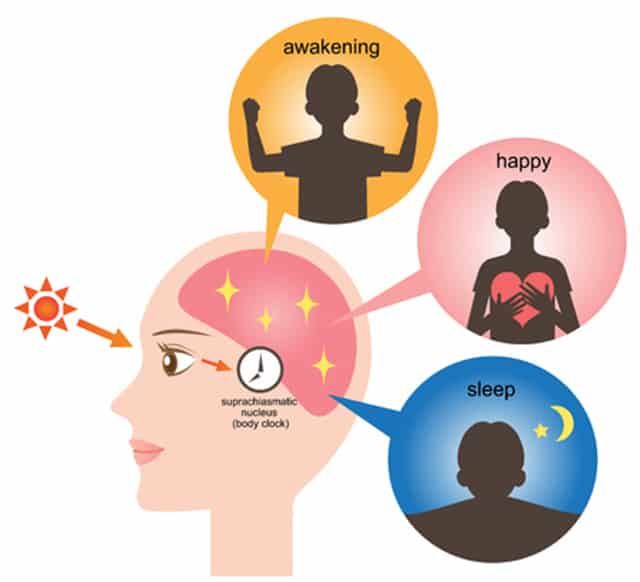This is a disorder that involves a lack of a proper sleeping routine. 7-9 pm sleepiness and early morning awakeningThis sleep phase advancement can interfere with daily social and work schedules and results in shortened sleep duration and excessive.
 What Is Circadian Rhythm And Why Do You Need It The Sleep Judge
What Is Circadian Rhythm And Why Do You Need It The Sleep Judge
Circadian rhythm is a an innate biologic feature of living organisms that relates to time and life functions.

Circadian rhythm and sleep. Often influenced by external factors such as light and dark and internal factors such as stress and anxiety the circadian rhythm maintains body temperature metabolism and the sleep-wake cycle. Are gut microbiota then the common link between sleep circadian rhythm and health. When we talk about circadian rhythms its mostly in relation to sleep.
Circadian rhythm sleep disorders CRSD also known as circadian rhythm sleep-wake disorders CRSWD are a family of sleep disorders which affect the timing of sleep. Inconsistent eating and sleeping patterns can throw off your circadian rhythm and increase your risk of developing a number of diseases. A disruption to the circadian rhythm can cause sleep disorders.
Generally this rhythm is based on a 24-hour period. Even if you do manage to fall asleep at night you might not sleep as soundly and you could be easily awakened by external cues. Some can be attributed to a timing issue in a persons internal timekeeping system.
These disorders can take different forms though for most disturbed sleep and excessive daytime sleepiness are common symptoms. Likewise not getting enough quality sleep can affect your physical and mental well-being. Sleep is regulated by a homeostatic and a circadian process.
Thats because when our circadian rhythm is out of sync our sleep is too. Your normal circadian rhythm is set by the cycle of light and dark over 24 hours. Your circadian rhythm helps control your daily schedule for sleep and wakefulness.
Circadian rhythm and sleep pressure are interconnected. Research is also revealing that circadian rhythms play an integral role in diverse aspects of physical and mental health. The two processes are known to be able to work independently but also to both influence sleep and sleep related variables in an additive or more complex manner.
Here they are along with their causes and symptoms. Maintaining a consistent circadian rhythm is essential for general health. But when this circadian rhythm is thrown off it can create significant sleeping problems including insomnia.
When properly aligned a circadian rhythm can promote consistent and restorative sleep. When it comes to sleeping certain disorders affect the sleep-wake circadian rhythm. Without the right signals from your bodys internal master clock you might not fall asleep have fragmented or sleep poorly or wake up too early and not be able to fall back to sleep.
This rhythm is tied to your 24-hour body clock and most. Circadian Rhythm Sleep Disorders refer to disruptions in the timing of sleep and wake and the consequences that result form the disruption. Advanced Sleep Phase Disorder ASPD also known as the advanced sleep-phase type ASPT of circadian rhythm sleep disorder is a condition that is characterized by a recurrent pattern of early evening eg.
In nights actual lighting levels helped patients and staff to connect which engendered feelings of calm. Circadian rhythm sleep disorders are caused by delays advances and complete dysregulation of a persons circadian cycle. It plays a key role in things like when you sleep and when you wake.
Why Do we Get Sleepy. Nearly all were pleased with the cycled lighting environment which together with daylight supported their circadian rhythm. People with this disorder tend to sleep at different intervals.
Not unlike the rest of the human body our gut microbiota fluctuate in response to circadian rhythm and feeding-fasting schedules. Patterns of brain waves hormone production. At the behavioural level then brain function is determined by the combined effects of circadian rhythmicity and sleep homeostasis the sleep pressure that builds up.
Irregular Sleep-Wake Rhythm Disorder. Sleeping well is a delicate combination of internal and external factors that are easily put out of balance. Circadian Rhythm and Sleep.
It is responsible for maintaining your daily schedule. Our body has its own clock with which it keeps track of the sleep and wake cycle. The most obvious symptoms of your circadian rhythm being desynchronized are an inability to sleep when you should or intense feelings of sleepiness when you are meant to be awake.
Together these two processes determine most aspects of sleep and related variables like sleepiness and alertness. Most had experiences from sleep disorders and half had nightmaressights and circadian rhythm disruption. Experimental data show a close relationship among melatonin circadian rhythms and sleep.
Circadian Rhythm Sleep Disorders. Sleep is an essential component of the human circadian cycle and has demonstrated health benefits. Low-dose melatonin treatment increasing circulating melatonin levels to those normally observed at night promotes sleep onset and sleep maintenance without changing sleep architecture.